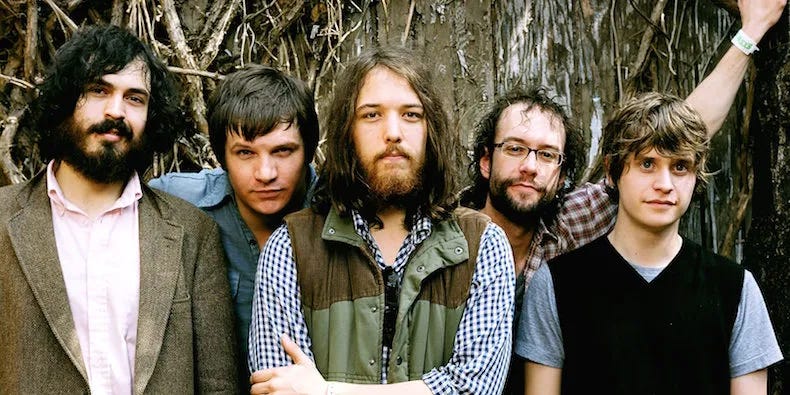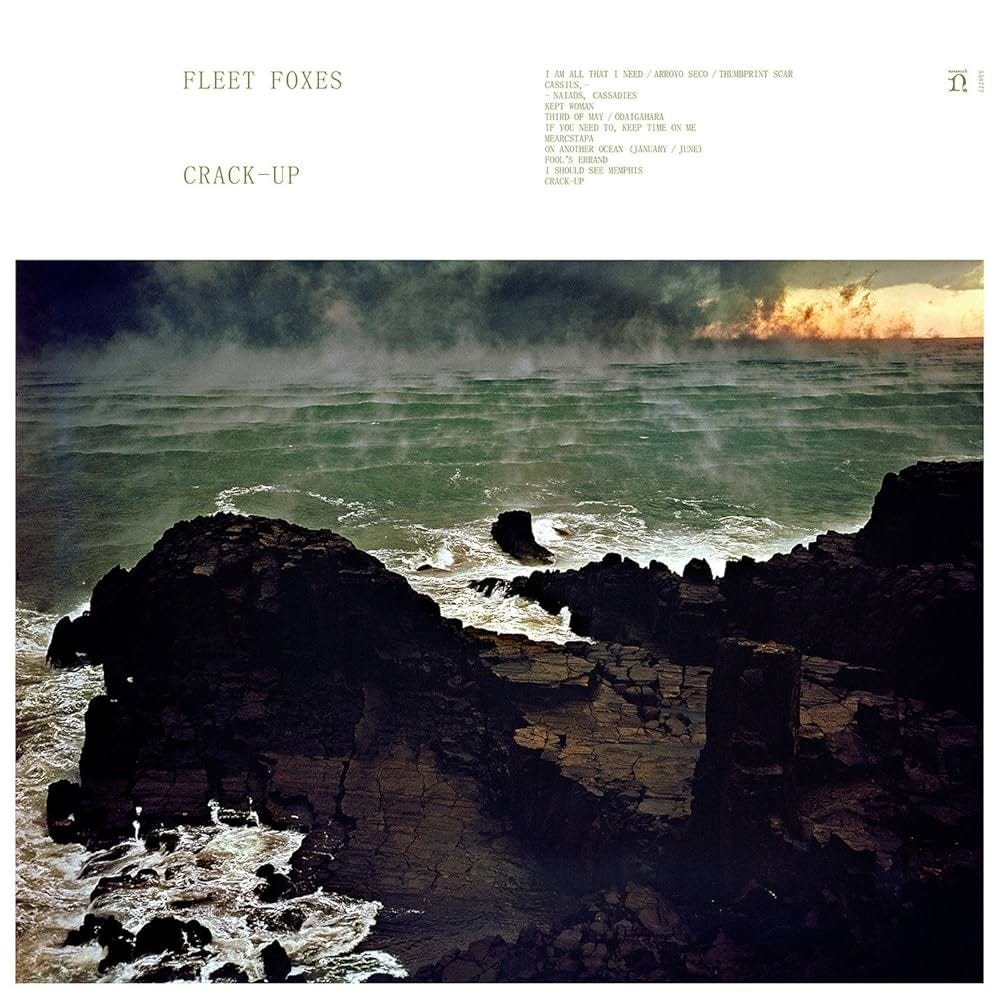space sound: Crack Up, by Fleet Foxes (LP)
a complex and precious record from the Seattle-based indie band
so it’s true, I’ve gone
too far to find you
Crack Up by Fleet Foxes is not an easy album.
And that is not something I say to justify a possible uninteresting newsletter (have I not already asked you to share this publication? - maybe now is a good time), it’s that I’m not really sure that this is an accessible record.
But for sure it’s a beautiful one, so I’ll give it a try.
Robin Pecknold created Fleet Foxes in 2005 along with Skyler Skjelset, whom he knew since high school. They were originally from Seattle, Washington, where the band officially formed with Casey Wescott on keyboard, Bryn Lumsden on bass and Nicholas Peterson on drums. Some of them would, along with some other band members (Craig Curran replaced Lumsden on bass, and was later replaced by Christian Wargo; Josh Tillman - Father John Misty - took the place of Peterson; Morgan Henderson later joined the band). On tour, the band also featured - Matt Barrick on drums, and now features Christopher Icasiano.
Pecknold is the main singer in the band, with some backing vocals by various members; he’s also the writer of the songs, that are frequently evocative of historical and geographical references, and not so easy to decipher.
Crack-Up came in 2017, after a six-year hiatus since the previous record, Helplessness Blues. It was produced by Pecknold and Skjelset, and features 11 tracks.
[Sixth floor, alone]
Crack-Up opens with “I Am All That I Need / Arroyo Seco / Thumbprint Scar” and a whisper.
[The band kicks the loner off the stage][Into the city]
Not only a whisper, also on the Bb / F chord that is the exact chord the last album ends on.
[Exit out of the city][Now memory]
Then the songs opens with up-tempo guitars.
[Out of memory]
(Distant light, distant dancer)
The place in the second part, almost like a teather piece, goes into the city.
[Back into the city][At the edge of the ocean]
The rhythm is more rapid, everything is electric, and in this atmosphere “It was all just water, winding by you”, Pecknold asks whether he could survive and resist to the night.
What if you say to me “I don't need you”: do I have to hope that you’re not meaning it? Or maybe it will be like “I never knew you”, and all will be behind us, like the sea?
[Under the water] [Rain]
In Cassius, - you’re [under the water], or maybe in the [rain]. The song is a reference among the others, to Cassius Clay (Muhammad Ali).
[Above the surface]
It starts underwater, where you feel difficult to breathe; in the first verse it opens up a bit and Pecknold’s voice starts to come out, only to explode in the first chorus. This movement is surrounded by guitars, bass drums, particularly in the choir.
[Under the water again]
The different sounds one encounters are also produced by instruments such as glass harmonica, harpsichord and organ. The song closes with a drone-y tail and a loop, to which are layered what sounds like a flute and an encore of drums.
[Above the surface]
[At sea, in a storm]
The natural prosecution of this song is the next, - Naiads, Cassadies.
[The storm suddenly breaks] [In a car, on the coast]
Here we encounter once again the superb writing style of the band’s lead singer, with an ode to the nymphs, which represent women whose “life was stolen from”. It’s a song that asks “Who”, and we can imagine it’s referred to all those things that happen between man and woman, that constitute a relationship.
[At night]
Kept Woman is about Anna, a woman that in the song is “lost in a shadow” of “cinder and smoke”.
[It bloomed]
[It wilted]
The singer acknowledges the bold nature of this woman, although she is “nameless”. But they’re “meant to be reconciled”, so he keeps his hope.
[It bloomed]
[It wilted]
Third of May / Ōdaigahara is a song that starts with a song that does exactly what I think songs do: it remains even when “light end[s] the night”. Now the rhythm is less tense, the sound is more open, guitar and drums go hand in hand to provide a compelling sound.
[It rose]
What happened on the third of may? “Everything fell in line”, Pecknold sings, “as it was designed”: but things are “painted in sand”, so the shore and the waves and water wash them away swiftly.
Aren’t we made to be crowded together, like leaves?
The song is like a journey, divided into phases, like Pecknold himself writes: first comes the upbeat, then the realisation of a doubt and the second part kicks in, with fraught sounds and instruments played solely by the wind, it appears.
[January 20th, 2017]
If You Need to, Keep Time on Me is a wonderful song. It is stripped down, comes deep from Pecknold’s experiences and relationships, and speaks of the necessity to be each other’s “time giver”, i.e. to lead in a song and set the rhythm during songs. Of course it’s a metaphor, but we must not be “too sure of the sun”.
[At sail on open ocean]
Mearcstapa is a song to be played on a boat in the ocean, “on an open sea”, to fear it once again, and even more. There is so much sea you can find its “eyes” everywhere, but you’ll find nothing, no sound the “foam” (the waves) makes, no phone ringing to save you, to comfort you.
Everyone is alone in their constant sea sailing. So who knows, “what will you find”?
[January] [Dorian]
In On Another Ocean (January / June) Pecknold talks about no matter how far away you sail with the previous song, you’ll “see all you leave behind you”. The same eyes that were all around the ocean are now “behind you”.
But then this conversation Pecknold is having with himself changes, and the mood and the rhythm change too.
[Alright, time to get over it, buddy] [Fuck this noise]
[Cut to June]
[Cut to June]
The song wraps you around comforts you while repeating too many “If only”, because life is also made of thinking and re-thinking about things.
[Major]
“Fool’s Errand” reminds me of a Christmas song I never listened to (must be the marimba). Pecknold creates one of the best sounding chorus of the record
It was a fool's errand
Waiting for a sign
But I can't leave until the sign comes to mind
A fool's errand
and then compares a lover to all life one can see. Not a fool, not at all.
The piano outro leaves us on the steps of “I Should See Memphis”, where Cassius comes back with a sybarite woman. This Cassius is more evidently a reference to Gaius Cassius Longinus, a Roman senator who plotted to kill Caesar, and Muhammad Ali, born in Kinshasa.
[...I don't think he got it]
Pecknold misses “the highway”, and now I do too, only to drive to Memphis.
The song ends on a drone sequence, and finally we arrive at the end, on the song which gives the name to the record.
[Iceberg]
[Iceberg]
Crack-Up is a song for which the words “won’t come”, but then Pecknold quotes Cicero, and then “all things change”, because the song hits a refrain which leads directly to the outro, where the sea comes back, “rising over me”.
[Exit]
This record is a profound experience, but it certainly is not an easy one.
Pecknold’s lyrics are cryptic and layered in significance, the sound is rarefied and diverse, and the song structure is not plain. It seems like a diary, a conversation, a confession, all in once.
At the end on the last song there is a recording of someone taking the stairs, or maybe just walking rapidly: where are they going? who are they?
Guess we’ll never know, but probably they’re going out in the sun, “facing the day”.
Can’t I just go to sleep?
You’re no more so blind to me
If you liked this, you could share this project with others. Here’s the button:
See you next time!






